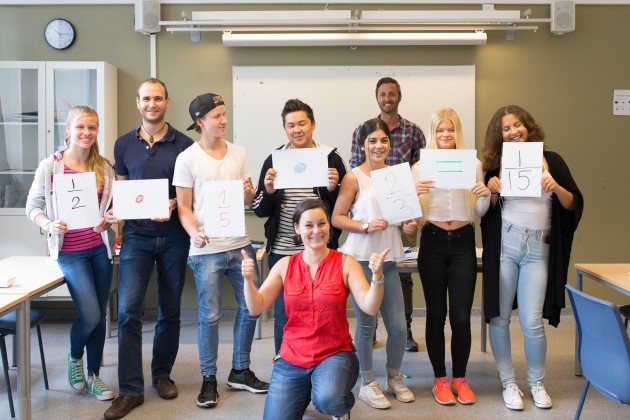
Teach for Belgium på besök
Teach for Belgium är en non-profit organisation som arbetar för en likvärdig skola. Belgien har väldigt liknande kontext som Sverige, där personer från utsatta områden med lägre socioekonomisk bakgrund har betydligt svårare att nå framsteg i skolan jämfört med personer med bättre förutsättningar. Ludwig är en del av Teach for Belgiums första cohort bestående av 22 stycken kandidater. Med skolstarten i Belgien närmandes så kommer snart deras andra cohort kliva ut i Belgiska klassrum.
Vi passade på att ställa ett par frågor till Ludwig under hans besök och intervjun kan man läsa nedan:
Hi Ludwig, can you tell us a little bit about yourself?
I’m a fellow of the Teach for Belgium program which I started in 2014, so I’m currently in my second year of teaching. I teach in a school called ”La Providence” which is located in one of the most empoverished neighbourghood of Brussels. I studied a the Université Libre de Bruxelles and I hold a master degree in Biology. Before embarking on the program, I worked for the public administration in Brussels (energy efficiency of building) as well as for a travel agency. I felt there was a lack of purpose in my job and was on the look for something closer to my own values. When I came across the Teach for Belgium program, something told me I would learn a lot from this experience, and it’s been true since I started.
What is the best thing about teaching?
To me, the best thing about teaching is the relationship that can be established with the students. In my school especially, relationships between students and teachers can get very, very strained and is, in my opinion, one of the main difficulties there. But I discovered that if I first gave what I was expecting to receive, like respect for example, it completely transformed the realtionships and became what I enjoyed the most in the job.
Now concerning the TFB program, best thing about it for me is the support I get from the team, the participants and my coach. I couldn’t have done it without it to be honest.
You visited two very different schools during your stay. What has been you biggest take-away from the school visits this week?
What was very inspiring to me was the differences I noted compared to Belgium. I loved the fact that everyone’s eating together at lunch in the schools, teachers and students together. It seems to close the distance that I do not like at all at my school. To me, you don’t learn from someone you do not like, and you do not need a distant relationship to get the respect from the students, which is what I witnessed in the two schools I visited. Also, it’s inspiring to see schools that are just different from mine, it proves that something different is possible, which many teachers at my school doubt. After these visit, I remembered thinking about the fact that people in general should be more aware that many different schools exist in the world. Not to prove that one is better than the other, but simply to show that many different systems exist and work in their own way. I’ve got a feeling that it might be something I’ll invest more time in a not-so-distant future…
What is your best advice to someone who wants to start teaching?
Hard to pick the best one, since there are so many things that I’d like to say to someone embarking on the journey. But probably the most useful one was given to me through my sporting experience and applies perfectly for any aspiring teacher. Here is the statement : ”Leave you ego at the door and aim for progression, not perfection. Trying to be perfect and better than anyone will leave you in tears”. To me, it perfectly illustrates the importance of being humble and above all, allowing yourself to make mistake and learn from them, instead of using it as a proof that your not fitted to be a teacher! Teaching is a skill that can be learned by anyone. As for all skills, it needs time and practice to be learned, and at the stard you WILL make mistakes, which is completely normal and even a good sign that you’re improving. So don’t be afraid to be wrong, after all, that’s what I expect from my students so why couldn’t I expect that from myself?
